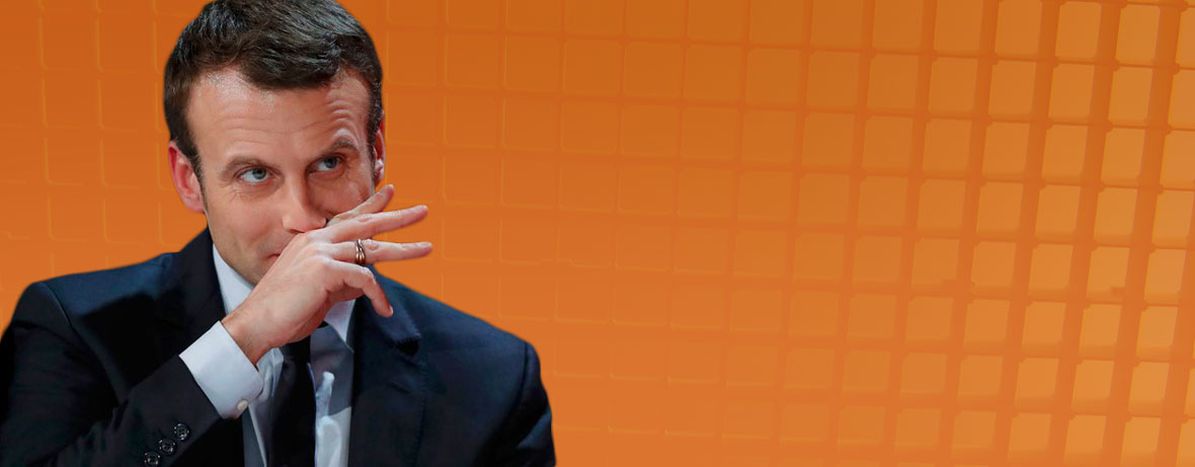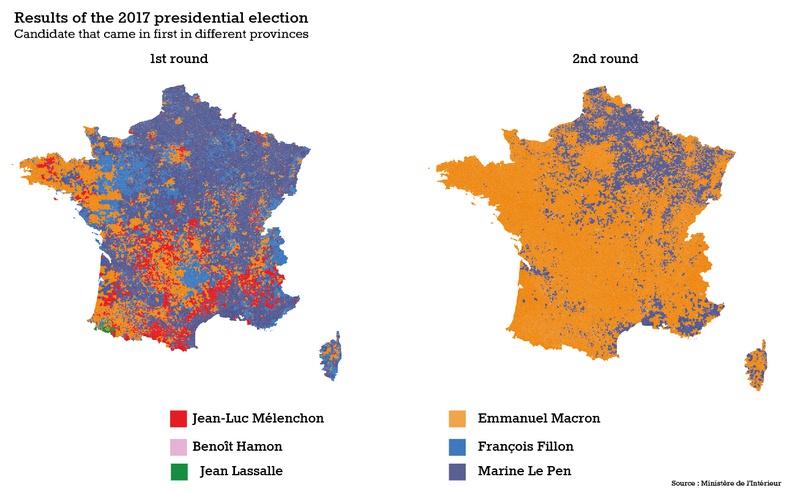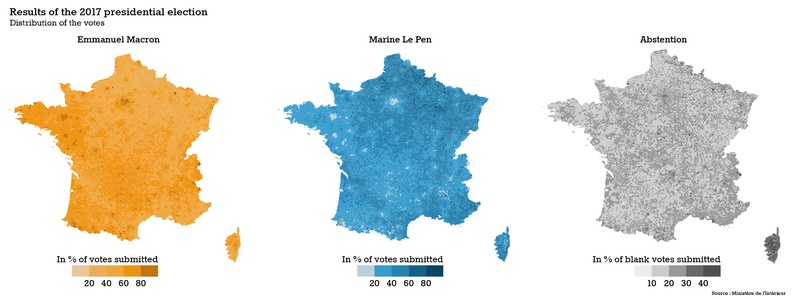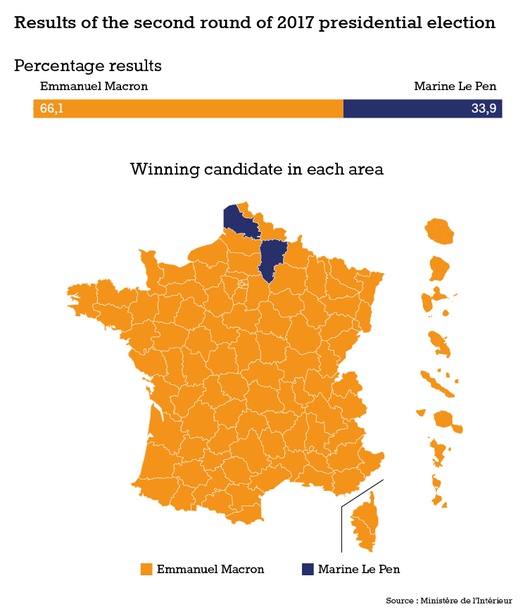
Emmanuel Macron's never-ending story
Published on
Translation by:
Emily SpencerEmmanuel Macron was elected President of the Republic by more than 20 million French citizens. While his journey to the Elysée makes a good story, it is one that must be viewed with caution, because neither the storyline nor the characters are yet known. The situation in France hasn't changed: the country is divided.
Let's be honest, nobody saw it coming. Six months ago, when Emmanuel Macron officially launched his bid for presidency, many thought that the likelihood of an En Marche! candidate winning the presidential election was as likely as a start-up specialising in VHS tapes becoming a hit. We were wrong. Completely and utterly wrong. Today, we are faced with a reality that was previously unfathomable: a 39-year-old man, who was unknown in the political sphere three years ago, has now been elected as President of the Republic.
Macron, Mad Max and Mario Bros
The screenplay was quickly written, motivated by a good dose of audacity. Macron had the courage to start a movement using his own initials (E.M.) to counter a government that freaks out each time it is forced to act. He had the courage to resign from his post as Minister of the Economy, taking a step into a dark void, neither stepping left nor right--an area in which many have already failed. But it is important to acknowledge that luck also played an important role. After all, luck won François Fillon the first round in the right-wing primaries, to the surprise of the general public. It was luck that resulted in Benoit Hamon burning himself on the ashes of the Socialist Party. En Marche! was launched like free-running ball, hurtling down a motorway, leaving the conservative candidates stranded with their scandals and the socialist candidates alone with their problems.
 The day after the first round of the elections, the results revealed that the country was truly divided. Like the United Kingdom and the United States of America, France has been split between the winners and the losers of globalisation. In reality, the country has been divided into four. On the way to the polls, En Marche! overtook the National Front. With 10 days left to vote, the movement witnessed the return of Jean-Luc Mélenchon's France Insoumise. These three groups shared France's support, particularly when it came to the subject of political apathy.
The day after the first round of the elections, the results revealed that the country was truly divided. Like the United Kingdom and the United States of America, France has been split between the winners and the losers of globalisation. In reality, the country has been divided into four. On the way to the polls, En Marche! overtook the National Front. With 10 days left to vote, the movement witnessed the return of Jean-Luc Mélenchon's France Insoumise. These three groups shared France's support, particularly when it came to the subject of political apathy.
The famous European 'pasofikation' [the term used to describe the near-disappearance of Pasok, the Social Democratic Party of Greece, Ed.], has been transferred to the conservatives because, for the first time in the history of the country. But Marine Le Pen has been part of the political landscape for 20 years, Jean-Luc Mélenchon has been politically active since 1968, Macron was the former Minister of the Economy, and François Fillon was resurrected, like a bad remake of Mad Max, only to be defeated in the second round.
 The French presidential election works in the same way as a Super Mario Bros game. When you lose, you go back to the start, when you win, you proceed to a new level. Pressing the play button triggers an intermittent battle between two rounds, throwing Melenchon's Insoumis and Fillon's conservative right into the battleground. The new level? Whirlpool: a factory situated in Picardie that manufactures tumble-dryers is set to close down. Relocating to Poland, hundreds of employees will lose their jobs as a result of globalisation. The game will play out in the factory's parking lot. To our right, Marine Le Pen is taking selfies. To our left, Emmanuel Macron demands a megaphone to convince the masses. A week before the ballots were cast, conflicting ideas about this divided country led to an unhappy skirmish. During the worst debate in the history of the French presidential elections, the extreme right B team argued with the candidates of the Republican Front. Emmanuel Macron finally had the opportunity to put his university-level economics knowledge to the test to fight off the enemy.
The French presidential election works in the same way as a Super Mario Bros game. When you lose, you go back to the start, when you win, you proceed to a new level. Pressing the play button triggers an intermittent battle between two rounds, throwing Melenchon's Insoumis and Fillon's conservative right into the battleground. The new level? Whirlpool: a factory situated in Picardie that manufactures tumble-dryers is set to close down. Relocating to Poland, hundreds of employees will lose their jobs as a result of globalisation. The game will play out in the factory's parking lot. To our right, Marine Le Pen is taking selfies. To our left, Emmanuel Macron demands a megaphone to convince the masses. A week before the ballots were cast, conflicting ideas about this divided country led to an unhappy skirmish. During the worst debate in the history of the French presidential elections, the extreme right B team argued with the candidates of the Republican Front. Emmanuel Macron finally had the opportunity to put his university-level economics knowledge to the test to fight off the enemy.
Ten percent
Now, 20 million French citizens have elected Emmanuel Macron. That is less than a third of the population, but still 66,1% of votes. On the polling maps, there is barely any variation in votes between the different departements. Despite the voter transfers, barriers and tactical voting, En Marche! won across the country. In the cities and in the countryside, from east to west, in the Fillonist and Melenchonist strongholds. While that may seem like a lot, it doesn't really mean a great deal. When we're reminded that 16 million voters chose to abstain, it's hard to tell what En Marche! really is. Yet some people say that 10% of the population have accepted the President-elect's ideas. Looking at the campaign staff, France seems like a happy, multi-cultural, young, pro-European country with a good looking, trainer-wearing president. But let's not forget that François Hollande's latest popularity rating was also at 10%.
 French politics works a little bit like GTA (Grand Theft Auto) does. Anything is possible, but it's rare for a player to reach their destination. After the presidential elections there will be the legislative elections, where the true colours of the future French Parliament will show. The next campaign that will take place on the 18th of June will finally reveal En Marche!'s true values. Now that Macron is president, his ideas can finally be implemented. His movement promised new faces, which are - up until now - unknown figures. They are supposedly "representatives of civil society" who will travel around the country, far from the cameras and strife of the media. People won't forget that this 'march forwards' will take place in a divided country, along with the National Front and the Insoumis. It might work, but it might not.
French politics works a little bit like GTA (Grand Theft Auto) does. Anything is possible, but it's rare for a player to reach their destination. After the presidential elections there will be the legislative elections, where the true colours of the future French Parliament will show. The next campaign that will take place on the 18th of June will finally reveal En Marche!'s true values. Now that Macron is president, his ideas can finally be implemented. His movement promised new faces, which are - up until now - unknown figures. They are supposedly "representatives of civil society" who will travel around the country, far from the cameras and strife of the media. People won't forget that this 'march forwards' will take place in a divided country, along with the National Front and the Insoumis. It might work, but it might not.
Whether you like him or not, Emmanuel Macron's climb to the Élysée Palace makes for a good story. Truth be told, this movie can't be watched on a VHS player. Macron's victory is the first episode of a long TV show that, up until now, has been exciting as it has been unpredictable.
Translated from Emmanuel Macron : l'histoire sans fin



